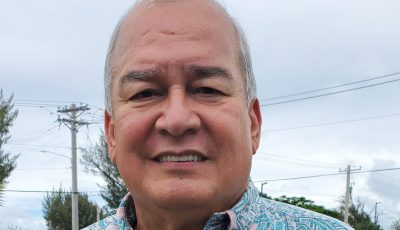An alternative class of candidacy
This is to clarify the objective of my recent “Amend the election law” letter to the editor. If you read the letter carefully you will find that it does not suggest by any means of tearing down the existing language of the CNMI election law. What it proposes is the inclusion of an alternative class of candidacy in order to make available to voters a broader and diversified range of persons for their selections. For instance, many of our sons and daughters are retiring from active military services and returning to the CNMI to settle and take care of their families. In addition, many people who were absent from the CNMI for a period of time are now considering returning to their home of origin and willing to serve in elected offices within the CNMI. These are large pools of CNMI people who were drawn away from these islands in search of a better way of life, and merely seeking for temporary resolve to their medical, educational, employment, and other social or economic needs of the time. In other words, these are people who may have left the CNMI but the CNMI never left them in spirit, honor, respect, value, and love for their home of origin.
The language in my letter to the editor proposes establishing two types of candidacy classification, i.e., a “domiciled” class candidacy, and a “non-domiciled” class candidacy. For the most part, many U.S. jurisdictions recognized domiciliary standards for voting purposes on two standards: 1. registered voter of a jurisdiction, and 2. intent of residency. A person may have a dual residency status, but still for domiciliary purposes in voting situations, a person will continue to be domiciled where he/she is registered to vote and declaring his or her intended place of residency. In the case of the CNMI, domiciliary standard relating to candidacy qualification for election purposes requires the person to have a continuous residency in the NMI. This may open an argument on semantics and intent of the present election law with respect to domiciliary, in which it may disqualify a candidate who may have a void because of noncompliance with the definition of what constitutes actual “domiciliary” in our election law.
On the other hand, the CNMI is a small jurisdiction in terms of size of population, and our voters’ selection limitations of candidates may be more a problem of the defined restriction of CNMI election law than resulting from a lack of interest of diversified people as potential candidates from and within a broader and available registered voters in the CNMI. Our CNMI voters could find the person with the best qualified, dignified, honest, willing, intelligent, and focused qualifications from all pool of people who are patriotic and mindful in designating the NMI as their home and birth of origin. In view of this, public policy matters are always checked and balanced by their actual and potential impacts. In this case, the alternative means should be considered in order to check and test the law’s intended effects, and thereby satisfy that the alternative means would result in enhanced voter utility as they will be better off when they receive the consequential benefits of the alternative.
Francisco R. Agulto
Kannat Tabla, Saipan



























